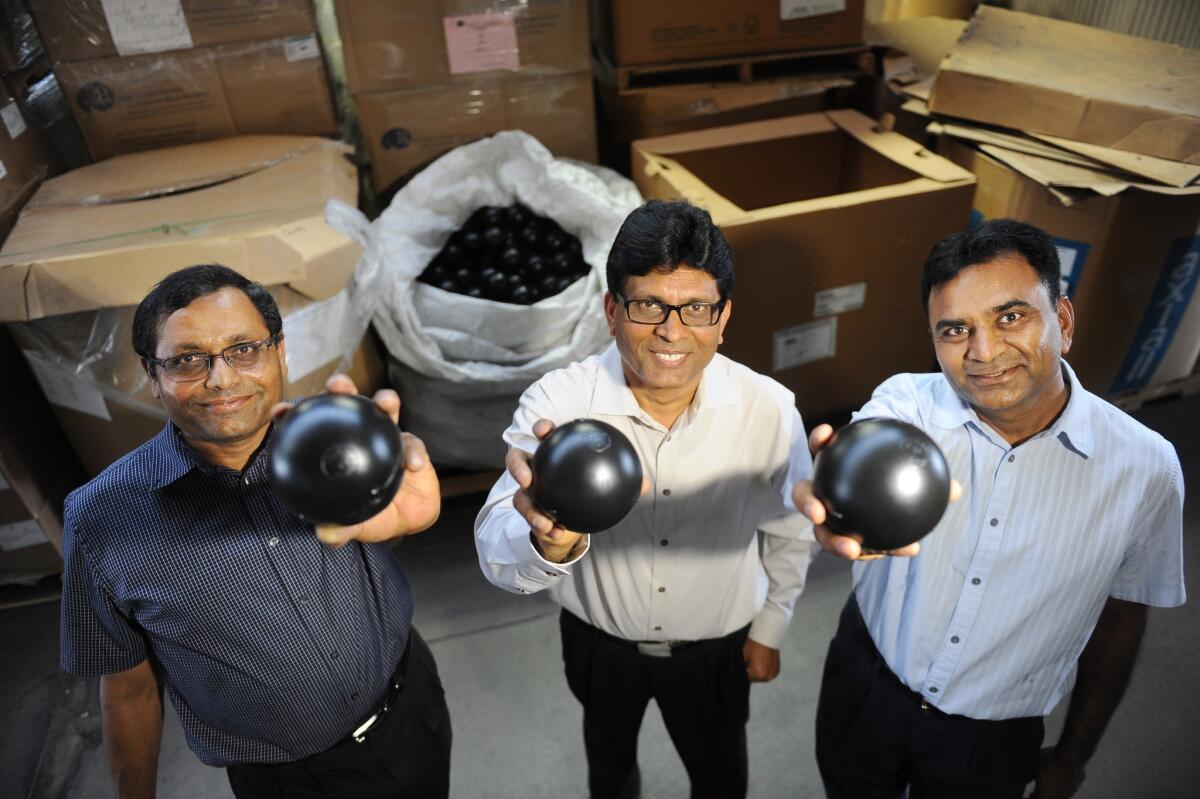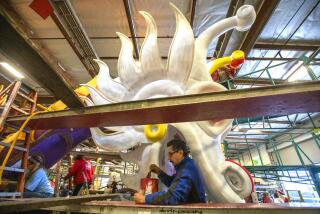Azusa plastics firm that makes shade balls has its moment in the sun

Business partners C.P. Kheni, left, Vasant Dobaria and Praful Bajaria of Artisan Screen Printing hold some of the 89.6 million black plastic shade balls manufactured at their plant in Azusa.
- Share via
Plastic heads, mascara tubes, foot-tall daiquiri glasses and dozens of cylindrical bottles form neat rows on shelves inside Artisan Screen Printing Inc.’s Azusa manufacturing facility.
During its 11 years in the blow molding business, the company has created millions of plastic containers.
But its most recent hit — a 4-inch-diameter black plastic ball — isn’t on display.
Last month the so-called shade balls became a viral hit after photos showed Los Angeles Mayor Eric Garcetti, along with officials from the city and the Department of Water and Power, unloading 20,000 of them into the Los Angeles Reservoir in Sylmar. The balls are intended to protect water quality by preventing chemical reactions triggered by the sun, such as the formation of algae, in reservoirs and also help to slow evaporation, according to the DWP.
Of the 96 million shade balls released at the L.A. Reservoir, 89.6 million were manufactured by Artisan. Another vendor, XavierC in Glendora, provided 6.4 million balls.
The order was Artisan’s largest contract ever. The Azusa company has about 80 employees, but hired an additional 90 to work on the shade balls order. It took the company about 21/2 years and an investment of more than $1 million for new machinery to complete the $30-million contract.
“It’s a business,” said Vasant Dobaria, a partner at Artisan. “We’re always looking for new opportunities.”
Dobaria took over Artisan in 2004 after leaving the electronic manufacturing industry. He and his business partners and family friends, Praful Bajaria and C.P. Kheni, expanded Artisan’s focus on screen printing for plastics to include the manufacturing of bottles and containers.
Small businesses like Artisan aren’t uncommon in the plastics industry — more than 80% of companies are small to medium-sized enterprises, said Bill Carteaux, president of the Society of the Plastics Industry, a trade organization. California is a large player in the industry, ranking second in the country in the number of plastics industry employees.
Dobaria and Bajaria emphasize that they did not invent shade balls. That distinction belongs to Brian White, a now-retired DWP biologist who based the idea on “bird balls,” which are found in ponds along runways.
The DWP has used shade balls since 2008 in open-air reservoirs such as Upper Stone Canyon Reservoir in the Beverly Glen area, Elysian Reservoir in Elysian Park and Ivanhoe Reservoir in the Silver Lake area. The balls are made of high-density polyethylene resin, the same plastic used in the DWP’s water pipes, and are black to prevent UV-light degradation and extend their life span, according to the DWP.
In 2012, Artisan won a bid to manufacture a majority of the shade balls based on specifications given by the DWP. Dobaria said the transition wasn’t hard.
“Either you make a plastic bottle or you make a shade ball,” he said. “It’s the same manufacturing process.”
Artisan purchased 20 yellow blow molding machines to complete the order and set up a separate line to work on the shade balls so the company could continue with its normal plastics manufacturing for other customers, Bajaria said.
In 2013, DWP awarded a second, smaller shade balls contract to XavierC, a broker that provided balls made by Microdyne Plastics Inc. in Colton.
Both companies had to be certified with the National Sanitation Foundation International, which provides public health and safety standards for appliances, food equipment and other products.
Once the shade balls were completed, Artisan shipped nearly 200,000 a day to the reservoir, Dobaria said.
But don’t count on Artisan becoming a shade ball-only manufacturer. Dobaria and Bajaria said they’ve gotten just a handful of inquiries about new shade ball orders.
In the meantime, Dobaria said, they’ll find a use for that new machinery.
samantha.masunaga@latimes.com
Twitter: @smasunaga
More to Read
Inside the business of entertainment
The Wide Shot brings you news, analysis and insights on everything from streaming wars to production — and what it all means for the future.
You may occasionally receive promotional content from the Los Angeles Times.











